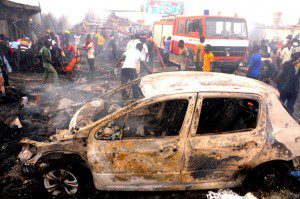
By Ahmed Rehab
I have three uncomfortable questions that I apologize for asking, but would owe a greater apology if I didn’t:
1. 2,000 currently feared dead in unprecedented Boko Haram terrorist carnage in Northern Nigeria this week. Two thoursand. No round the clock coverage on CNN or other networks. After all, the victims are African. Imagine if it were 2,000 French or American victims. Would the coverage have changed? Honest question. Really imagine it. If yes, then why?
2. In Yemen, 37 were killed in a terrorist attack on the exact same day as the Charlie Hebdo terrorist attack — byy the exact same culprit, Al Qaeda of Yemen. No round the clock coverage on CNN or other networks. After all, the victims were all Muslims. Imagine if it were 37 French or American victims. Would the coverage have changed? Honest question. Really imagine it. If yes, then why?
3. In 2011, the worst terrorist attack in the history of Norway claimed 77 lives and 319 injuries, mostly children. CNN coverage and world outrage and solidarity then does not compare to that now with the Charlie Hebdo and subsequent attacks that had 80 percent less deaths. In the Norway terrorist attack, the media wondered if the perpetrator was deranged before conclusive evidence made it impossible to ignore that he was a White Christian fundamentalist terrorist. Would the coverage, outrage and solidarity have changed had he been a Muslim immigrant? If he had been a Mohamed Abdullah instead of an Anders Breivik? Honest question. Really imagine it. If yes, then why?
Let’s be clear. I am incensed by the unjustifiable terrorist attack against Charlie Hebdo and the Kosher market. I have written plenty to express my outrage. In fact, It is because I am a Muslim who loves his faith that I have more of a personal beef with Muslim extremism and terrorism than any other form — not less. This is not to downplay these attacks; to the contrary, it is to ask why the others were downplayed *in comparison*
These are honest and valid questions that compare apples to apples. There is a noticeable disparity that reasonable people are obliged to question and ask, “Why?”
One possible answer is that this for many is more than just about terrorism and victims. This is about entrenched narratives and identity politics. Incidents that do not validate this narrative (Arab on Arab, black on black, or white Christian on white) won’t nearly be as celebrated as incidents that do (Muslim on white).
Those who wish to convince the world that Islam is the problem, are as much a part of the problem as those who purport to camouflage their problems behind the cloak of Islam. Both sets of expedient ideologues are on one side, and the rest of us on the other.
Whether purposeful or unwitting — which is quite possible by the way — our disposition to the narrative of the East/West divide, the invading hordes, the clash of civilizations is a timid yet omnipresent undercurrent in mainstream consciousness. This makes it easi(er) for the extremist ideologues on both sides who are explicitly wedded to this narrative and who are hell-bent on causing it to dominate a world where their stocks rise and their power and importance increases to find success, God forbid. It is for this reason that they each do what they do whether Muslim extremists or anti-Muslim extremists (Islamophobes).
We must question. We must challenge. If you think a minority of kooks can’t wreck our world, well they can, but only “by our own hands.”
Ahmed Rehab is an American Muslim activist and writer with a focus on contemporary social issues including civil rights, media relations, and Islam-West relations. He is the executive director at CAIR-Chicago.














